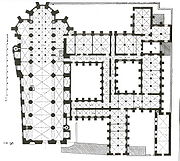
Katharineum
Encyclopedia

Humanism
Humanism is an approach in study, philosophy, world view or practice that focuses on human values and concerns. In philosophy and social science, humanism is a perspective which affirms some notion of human nature, and is contrasted with anti-humanism....
gymnasium
Gymnasium (school)
A gymnasium is a type of school providing secondary education in some parts of Europe, comparable to English grammar schools or sixth form colleges and U.S. college preparatory high schools. The word γυμνάσιον was used in Ancient Greece, meaning a locality for both physical and intellectual...
founded 1531 in the Hanseatic
Hanseatic League
The Hanseatic League was an economic alliance of trading cities and their merchant guilds that dominated trade along the coast of Northern Europe...
city Lübeck
Lübeck
The Hanseatic City of Lübeck is the second-largest city in Schleswig-Holstein, in northern Germany, and one of the major ports of Germany. It was for several centuries the "capital" of the Hanseatic League and, because of its Brick Gothic architectural heritage, is listed by UNESCO as a World...
, Germany
Germany
Germany , officially the Federal Republic of Germany , is a federal parliamentary republic in Europe. The country consists of 16 states while the capital and largest city is Berlin. Germany covers an area of 357,021 km2 and has a largely temperate seasonal climate...
. In 2006 the 475th anniversary of this Latin school
Lateinschule
Latin school was the grammar school of 14th to 16th century Europe, though the latter term was much more common in England. Emphasis was placed, as the name indicates, on learning to use Latin. The education given at Latin schools gave great emphasis to the complicated grammar of the Latin...
was celebrated with several events. The school uses the buildings of a former Franciscan
Franciscan
Most Franciscans are members of Roman Catholic religious orders founded by Saint Francis of Assisi. Besides Roman Catholic communities, there are also Old Catholic, Anglican, Lutheran, ecumenical and Non-denominational Franciscan communities....
monastery next to Saint Catherine Church, which was extended in the 1880s.
At the Katharineum it is possible to choose Latin
Latin
Latin is an Italic language originally spoken in Latium and Ancient Rome. It, along with most European languages, is a descendant of the ancient Proto-Indo-European language. Although it is considered a dead language, a number of scholars and members of the Christian clergy speak it fluently, and...
as the first foreign language. In year nine it is also possible to choose ancient Greek
Ancient Greek
Ancient Greek is the stage of the Greek language in the periods spanning the times c. 9th–6th centuries BC, , c. 5th–4th centuries BC , and the c. 3rd century BC – 6th century AD of ancient Greece and the ancient world; being predated in the 2nd millennium BC by Mycenaean Greek...
as the third foreign language.
Thomas Mann
Thomas Mann
Thomas Mann was a German novelist, short story writer, social critic, philanthropist, essayist, and 1929 Nobel Prize laureate, known for his series of highly symbolic and ironic epic novels and novellas, noted for their insight into the psychology of the artist and the intellectual...
, himself a student of the Katharineum, thought of this school when describing the school Hanno went to in the Buddenbrooks
Buddenbrooks
Buddenbrooks was Thomas Mann's first novel, published in 1901 when he was twenty-six years old. The publication of the 2nd edition in 1903 confirmed that Buddenbrooks was a major literary success in Germany....
. Mann, who as a bad student had to resit two years, made it clear that he disliked the Katharineum by describing both the school and the teachers with strong sarcasm.
Famous students
- Blumenberg, HansHans BlumenbergHans Blumenberg was a German philosopher.He studied philosophy, Germanistics and classics and is considered to be one of the most important German philosophers of recent decades...
- Carlebach, FelixFelix CarlebachFelix Falk Carlebach was a German-born British Rabbi in Manchester, England.He was an honorary citizen of the city of Lübeck and had both German and British citizenship.-Life:...
- Geibel, EmanuelEmanuel GeibelEmanuel von Geibel , German poet and playwright, was born at Lübeck, the son of a pastor in the city.He was originally intended for his father's profession and studied at Bonn and Berlin, but his real interests lay not in theology but in classical and romance philology. In 1838 he accepted a...
- Mühsam, ErichErich MühsamErich Mühsam was a German-Jewish anarchist essayist, poet and playwright. He emerged at the end of World War I as one of the leading agitators for a federated Bavarian Soviet Republic....
- Overbeck, Friedrich
- Radbruch, GustavGustav RadbruchGustav Radbruch was a German legal scholar and politician. He served as Minister of Justice of the German Empire during the early Weimar period. Radbruch is also regarded as one of the most influential legal philosophers of the 20th century.-Life:Born at Lübeck, Radbruch studied law in Munich,...
- Storm, TheodorTheodor StormHans Theodor Woldsen Storm , commonly known as Theodor Storm, was a German writer.-Life:Storm was born in Husum, at the west coast of Schleswig than an independent duchy and ruled by the king of Denmark...

